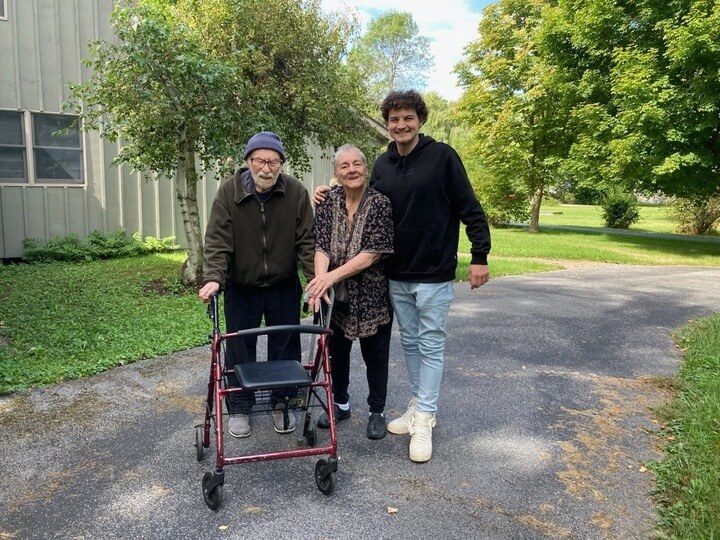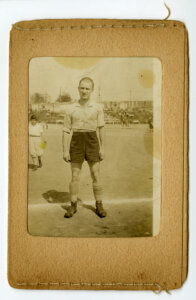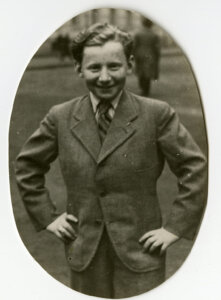A Jewish man was charged in a plot against synagogues. His parents want you to know the whole story
Matthew Mahrer, who’s descended from a famous Holocaust survivor, desperately needed help. He’s finally getting it

Graphic by Angelie Zaslavsky
There’s a reason Susan and Michael Mahrer contacted the Forward to tell their son Matthew’s story.
Matthew Mahrer was arrested Nov. 18, 2022, in New York’s Penn Station, with another man, Christopher Brown. They were picked up by police after a Jewish security team flagged tweets that Brown allegedly posted threatening to “shoot up a synagogue” and “brutally murder people.” Both men were charged with conspiracy and weapons possession.
Matthew’s parents believe their son, age 23, who’s due back in state Supreme Court in Manhattan on Sept. 19, will be exonerated. But just as important, they want “the community most affected by this,” as Susan put it — meaning the Jewish community — to know they believe Matthew poses no danger to others.

Matthew’s grandfather, Jerry, 94, is a Holocaust survivor, as was Jerry’s father, Pavel (Paul) Mahrer. Pavel was a Czech soccer star whom the Nazis kept alive in the Terezin concentration camp to play games for their entertainment. The Museum of Jewish Heritage in Lower Manhattan has a collection of more than 100 artifacts related to his story.
“What Matthew struggles with now, more than what he’s facing legally, is the shame of tarnishing the family name, and the history,” said Susan. Equally upsetting to him is the notion that “he’s being accused of wanting to hurt people from his own community, both his physical community, the Upper West Side, and the Jewish community,” Michael said.
The Mahrers “would never deny that Matthew’s had a lot of ups and downs,” Michael said. “But he’s never hurt anybody.”
Name-calling and veiled threats

Matthew and Brown’s arrests generated headlines for days, and prompted Mayor Eric Adams to thank the NYPD for “bringing these bigots to justice.”
News reports about the case unleashed fear and anger in the neighborhood. The Mahrers live on West 94th Street in Manhattan within six blocks of four synagogues. When a judge let Matthew out on $300,000 bail — over the district attorney’s objections — City Councilwoman Gale Brewer called the release “outrageous.”
In courthouse hallways, men wearing yarmulkes shouted “Murderer!” and “Baby killer!” in Matthew’s face. One member of a nearby synagogue directed this comment at Matthew through reporters: “If you are going to get us, we are going to get you.”
Those reactions led the family to walk “around the neighborhood with our heads down because people might be out to get us or hurt Matthew,” Susan said. “I wouldn’t let him go outside for months.”
Homeless for 10 months
Matthew’s parents declined to make him available for an interview, but they spoke frankly about his challenges: Matthew has autism spectrum disorder. “He’s high-functioning, but he is autistic,” said his father. He’s been “under the care of psychiatrists and therapists since he was 3,” his mother said.
Not all of that care has been helpful. He was “bullied mercilessly” in public middle school, then bounced through four residential high schools over 3 ½ years, none of which truly met his needs, the Mahrers said.
Matthew returned to his parents’ apartment as the pandemic shutdown began. “But he couldn’t handle being home,” his mom said. He began living in homeless shelters and on the streets.
After 10 months, Matthew returned home in January 2021. “He was really suffering from PTSD, but it was nearly impossible to get him services,” Susan said. Care providers were overwhelmed at that point in the pandemic. His parents finally connected him with a clinic, but he had just one in-person meeting there with a doctor . “We couldn’t even get them to pick up the phone,” Michael said.
When Matthew was released on bail, his parents worried he might harm himself once he understood what he was accused of and the magnitude of publicity. He was sent to Elmhurst Hospital, and from there, referred to Bailey House Behavioral Health Center and Pathway Home. “He’s finally getting the help he needs,” Susan said. “He’s been doing very well.” Ironically, she added, “it took him getting in trouble for him to start getting the care he needed all along.”
The charges — and the aftermath
Matthew and Brown are both charged with conspiracy and weapons possession. Brown, whose alleged tweets led to the arrests, faces additional charges of making a “terroristic threat” and threatening to carry out a hate crime.
Matthew met Brown at the last residential school he attended. The two stayed in touch via online gaming.
The gun charges stem from a pistol found in Matthew’s room. Michael and Susan believe Brown dropped the weapon there knowing the police were after him. The Mahrers say they voluntarily gave the weapon to police.

Prosecutors said Brown also had a hunting knife, ski mask and swastika armband when he was apprehended at Penn Station, and that Brown gave Matthew $650 to buy the gun. Unlike Matthew, Brown was not released on bail.
A third man, Jamil Hakime, was accused of driving Matthew and Brown to Pennsylvania to get the gun. In July, Hakime pleaded guilty to a federal charge of conspiracy to transport a firearm across state lines. Hakime apparently met Matthew when he was homeless; Hakime lived in the building of a man who occasionally invited Matthew to stay with him, his parents said.
Brown, who also has a history of mental illness, told police he runs a “white supremacist Twitter group” and that Matthew was one of his “followers.” But Matthew’s mother disputes that, saying that Matthew often accessed the internet via her cellphone and she knows “he wasn’t into this stuff because I checked up on him.”
Vice reported that Brown often posted in various online neo-Nazi communities, but the Mahrers believe Brown acted alone when he made the threatening tweets. Experts at the ADL Center on Extremism and the Southern Poverty Law Center told the Forward they were not aware of Brown leading any group.
The Mahrers’ lawyer, Brandon Freycinet, believes Matthew was “unfairly dragged” into the case and that the evidence does not support the charges against him. Freycinet and the Mahrers are hopeful the case will be resolved without jail time.
But what happens after? “In the world of the internet, Matthew has been given a life sentence for being a white supremacist-antisemite-monster-terrorist,” Susan said.
Family identity and the Holocaust

Matthew spent the summer volunteering at a food pantry and helping to care for his grandfather Jerry, who has dementia and lives upstairs from Michael and Susan. Matthew helps his grandmother, Carolyn, who uses a walker, with chores like vacuuming, linen-changing and watching Jerry if she goes out.
Jerry was born in New York when his father Pavel, the Czech soccer star, played for Jewish American soccer teams in the 1920s. The family returned to Europe when the Depression hit — just as Hitler was rising to power.
Nearly their entire extended family was exterminated by the Nazis. Pavel, his wife and children survived, “mainly because he got preferential treatment,” Michael said.
Pavel was imprisoned at the Terezin concentration camp outside Prague, which the Nazis maintained for propaganda purposes as a “model” camp. Although Terezin was not an extermination camp, conditions were terrible. Thousands of Jews died there, and many were sent from Terezin to their deaths at Auschwitz. Pavel managed to survive playing soccer for the entertainment of German soldiers.
Meanwhile, because of Jerry’s U.S. citizenship, Jerry and his brother were imprisoned in Germany in a camp for Americans. Jerry, age 13, was the youngest internee there. Their mother Betty was held in a camp for American women. Betty and her sons were sent to the U.S. in a wartime prisoner exchange and Pavel joined them after liberation.

Matthew worked with his grandmother on a project chronicling Jerry’s experiences that’s been shown around their neighborhood. The yellow star that Jews were required to wear has been displayed in their living room all Matthew’s life.
“Our family’s entire identity is wrapped around that story,” Michael said.
The Mahrers are grateful that Jerry’s dementia means he’s not aware of Matthew’s arrest. “He would be Matthew’s biggest advocate,” Susan said, “but after the life that he led, this would kill him.”
When Matthew was younger, they’d hoped he’d have a bar mitzvah, but the process proved too challenging. While the Mahrers don’t now belong to a synagogue, they still observe holidays and traditions as a family.
But now they wonder whether, and how, they fit into the Jewish world. The Zionist Organization of America asked people to show up at Matthew’s court hearings to “send an important message,” and the Mahrers were stunned by the hate directed at Matthew by strangers. “Do I belong to this community that turned on me?” Susan asked.
The silver lining
Michael taught GED classes for years and now provides college counseling to students with special needs. He planned to retire this year, but with Matthew’s legal fees mounting, he’s postponed that. Susan runs a gift shop.
In contrast to the hostility from some in the community, neighbors in their building — where Michael also grew up — have been supportive. “That’s the silver lining,” Michael said.

And at least one person who was initially upset by Matthew’s release on bail now says he feels “sympathy” for the family. Sheldon Fine, a chaplain, community board member and vice chair of the West Side Council of Jewish Organizations, told the Forward he was “afraid initially because here was someone who was participating in what was possibly an attack upon a synagogue, and he was living around the corner from a synagogue and a few blocks from my synagogue and other synagogues.”
Then the Mahrers met with him. “I told him honestly, if I thought my son was capable of hurting even one person, we wouldn’t have bailed him out,” Susan said.
Fine said he hopes to attend the Sept. 19 hearing and offer the family support. “When it comes down to it, we’re talking about people to people, in addition to a Jewish couple with a grandfather living upstairs who’s a survivor,” he said. “We want compassionate justice for Matthew,” including “a just sentence where he’ll get the help he needs.”
Editor’s note: This story has been corrected to provide the right link for Pathway Home.






















